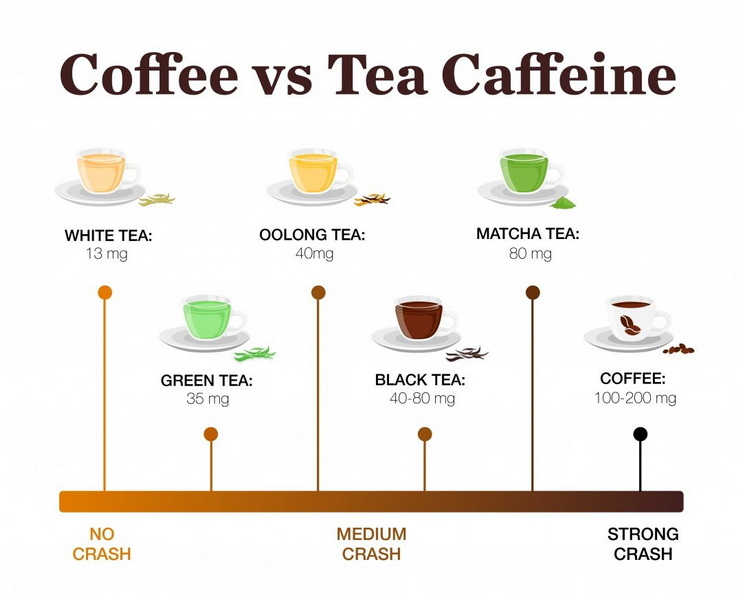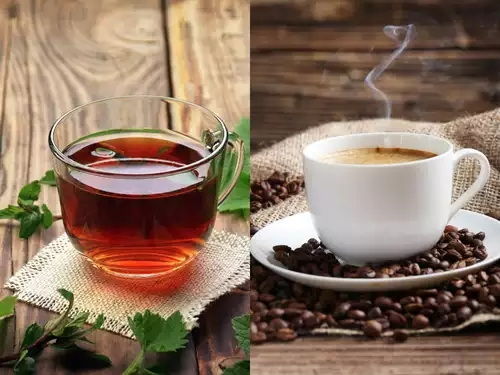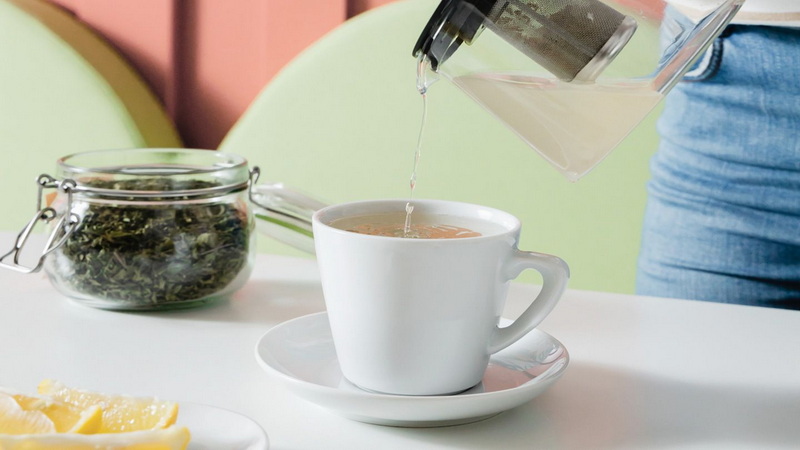Content Menu
● Understanding Caffeine
● Caffeine Content in Green Tea Extract
● Caffeine Content in Coffee
● Comparison Table: Caffeine Content
● Factors Affecting Caffeine Levels
● The Role of L-Theanine in Green Tea
>> Benefits of L-Theanine
● Health Benefits of Green Tea Extract vs. Coffee
>> Key Antioxidants in Green Tea
>> Key Benefits of Coffee
● Conclusion
● Frequently Asked Questions (FAQ)
>> 1. Is green tea extract stronger than coffee?
>> 2. Can I drink both green tea and coffee?
>> 3. Does green tea extract help with weight loss?
>> 4. How does L-theanine affect caffeine's impact?
>> 5. Is decaffeinated green tea still beneficial?
● Citations:
Caffeine is one of the most widely consumed psychoactive substances in the world, found in various beverages, including coffee and tea. Among these, green tea extract has gained popularity for its health benefits and unique properties. This article explores the caffeine content in green tea extract compared to coffee, examining the implications for health and wellness.

Understanding Caffeine
Caffeine is a natural stimulant that primarily affects the central nervous system. It can enhance alertness, improve mood, and boost energy levels. While both coffee and green tea contain caffeine, their effects on the body can differ significantly due to the presence of other compounds.
Caffeine Content in Green Tea Extract
Green tea extract is derived from the leaves of the Camellia sinensis plant. The caffeine content in green tea extract can vary widely depending on several factors, including the brand and preparation method.
- Typical Caffeine Levels: On average, an 8-ounce cup of brewed green tea contains between 30 to 50 mg of caffeine. However, concentrated forms like green tea extract capsules can have much higher levels:
- Some brands contain as little as 25 mg of caffeine per serving.
- Others may exceed 200 mg per serving depending on concentration and formulation.
Caffeine Content in Coffee
Coffee is renowned for its higher caffeine content compared to most teas. An 8-ounce cup of brewed coffee typically contains:
- Standard Caffeine Levels: Between 80 to 100 mg of caffeine, with some brews containing up to 200 mg depending on the type of coffee bean and brewing method.
Comparison Table: Caffeine Content
| Beverage | Average Caffeine Content (mg) |
| Brewed Green Tea | 30 - 50 |
| Green Tea Extract | 25 - 200+ |
| Brewed Coffee | 80 - 200 |
Factors Affecting Caffeine Levels
Several factors influence the caffeine content in both green tea and coffee:
- Brewing Time: Longer brewing times generally result in higher caffeine extraction.
- Temperature: Hot water extracts more caffeine than cold water.
- Type of Leaf or Bean: Different varieties of tea leaves (e.g., matcha) and coffee beans (e.g., Arabica vs. Robusta) have varying caffeine contents.
- Preparation Method: Concentrated forms like espresso will have more caffeine per ounce than standard brewed coffee or tea.
The Role of L-Theanine in Green Tea
One significant difference between green tea and coffee is the presence of L-theanine, an amino acid found in green tea. L-theanine has calming effects that can mitigate some of the jitteriness associated with caffeine consumption. This results in a more stable energy boost from green tea compared to the often abrupt spike followed by a crash from coffee.
Benefits of L-Theanine
- Calming Effect: L-theanine promotes relaxation without drowsiness, helping to create a state of calm alertness when combined with caffeine.
- Improved Cognitive Function: Studies suggest that L-theanine enhances attention and focus when paired with caffeine, making it a beneficial combination for tasks requiring mental acuity.

Health Benefits of Green Tea Extract vs. Coffee
Both beverages offer unique health benefits beyond their caffeine content:
- Green Tea Extract:
- Rich in antioxidants, particularly catechins.
- May aid in weight loss and improve metabolic health.
- Associated with lower risks of certain diseases, including heart disease.
Key Antioxidants in Green Tea
The primary antioxidants found in green tea are catechins, with epigallocatechin gallate (EGCG) being the most potent. These antioxidants help combat oxidative stress and may reduce inflammation:
- Weight Management: Research indicates that catechins may enhance fat oxidation and improve metabolic rates, which could aid weight loss efforts.
- Cardiovascular Health: Regular consumption of green tea has been linked to improved cholesterol levels and reduced blood pressure.
- Cancer Prevention: Some studies suggest that EGCG may inhibit cancer cell growth and reduce tumor size.
- Brain Health: The antioxidants in green tea may protect against neurodegenerative diseases by reducing oxidative stress on brain cells.
- Diabetes Management: Green tea may help regulate blood sugar levels and improve insulin sensitivity.
- Oral Health: The antibacterial properties of catechins can help reduce oral bacteria and prevent cavities.
Health Benefits of Green Tea
- Linked to improved cognitive function and reduced risk of neurodegenerative diseases.
- Contains antioxidants that may help protect against certain cancers.
Key Benefits of Coffee
Coffee is also rich in antioxidants but has different effects compared to green tea:
- Enhanced Mental Alertness: The higher caffeine content provides a quick boost in energy levels and cognitive function.
- Reduced Risk of Certain Diseases: Studies have shown that regular coffee consumption is associated with a lower risk of Parkinson's disease, Alzheimer's disease, and certain types of cancer.
- Metabolic Boost: Coffee can enhance metabolic rate temporarily, aiding weight management.
Conclusion
In summary, while coffee generally contains more caffeine than green tea extract, the specific amount can vary widely based on preparation methods and product types. Green tea's unique combination of caffeine and L-theanine offers a different experience that many find beneficial for focus and calmness without the jitters often associated with coffee. Both beverages provide significant health benefits; thus, choosing between them may depend on individual preferences regarding taste, desired effects, and health goals.

Frequently Asked Questions (FAQ)
1. Is green tea extract stronger than coffee?
Green tea extract can be stronger than coffee in terms of antioxidant properties but typically has less caffeine unless concentrated forms are used.
2. Can I drink both green tea and coffee?
Yes, many people enjoy both beverages as they provide different benefits; just be mindful of total caffeine intake.
3. Does green tea extract help with weight loss?
Some studies suggest that green tea extract may aid weight loss due to its metabolism-boosting properties.
4. How does L-theanine affect caffeine's impact?
L-theanine helps balance the stimulating effects of caffeine, leading to a more sustained energy level without jitters.
5. Is decaffeinated green tea still beneficial?
Yes, decaffeinated green tea retains many health benefits but with significantly lower caffeine content.
Citations:
[1] https://pmc.ncbi.nlm.nih.gov/articles/PMC6412948/
[2] https://www.sugimotousa.com/blog/green-tea-vs-coffee-everything-you-need-to-know
[3] https://www.healthline.com/nutrition/10-benefits-of-green-tea-extract
[4] https://www.psu.edu/news/research/story/research-suggests-green-tea-exercise-boost-weight-loss-health
[5] https://pmc.ncbi.nlm.nih.gov/articles/PMC4480845/
[6] https://www.youtube.com/watch?v=S55upIBmu0Q
[7] https://www.youtube.com/watch?v=WjxgqjZuZlU
[8] https://www.drlisawatson.com/wp-content/uploads/2011/04/Caffeine-Chart4.pdf
[9] https://www.mountsinai.org/health-library/herb/green-tea
[10] https://emerginginvestigators.org/articles/variation-in-caffeine-concentration-among-different-weight-loss-supplements-containing-green-tea-and-green-coffee-extracts/pdf
[11] https://www.fitday.com/fitness-articles/nutrition/healthy-eating/which-is-higher-in-antioxidants---coffee-or-tea.html
[12] https://pubmed.ncbi.nlm.nih.gov/26093535/
[13] https://nioteas.com/blogs/green-tea/green-tea-vs-coffee-caffeine
[14] https://www.youtube.com/watch?v=AFipYwG9AXA
[15] https://pubmed.ncbi.nlm.nih.gov/18681988/
[16] https://pmc.ncbi.nlm.nih.gov/articles/PMC2855614/
[17] https://www.historyofceylontea.com/ceylon-publications/ceylon-tea-articles/how-much-caffeine-does-tea-have-compared-with-coffee.html
[18] https://www.nature.com/articles/s41598-020-70037-7
[19] https://pubmed.ncbi.nlm.nih.gov/11453788/
[20] https://www.medicalnewstoday.com/articles/269538
[21] https://tigogreen.de/en/greentea-greentea-extract/
[22] https://www.youtube.com/watch?v=ueAM6O9iYXo
[23] https://www.shutterstock.com/search/health-benefits-green-tea
[24] https://www.anatomystuff.co.uk/whats-in-your-drink-caffeine-poster-coffee-tea-chart.html
[25] https://www.sugimotousa.com/blog/green-tea-vs-coffee-everything-you-need-to-know
[26] https://archive.attn.com/stories/6942/chart-caffeine-content-common-drinks






























